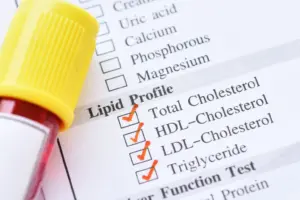
Stress and Cholesterol: We all understand the importance of monitoring cholesterol levels. Most of us also deal with stress, whether it’s from work, family life or just daily responsibilities. But have you ever wondered if these two are connected? Yes. Stress and cholesterol are interconnected, and understanding this connection can help you safeguard your heart and enhance your overall health.
What is stress?
Stress is your body’s natural reaction to something challenging or demanding. It could be an upcoming exam or a deadline, financial pressure, health worries or even traffic. When you feel stressed, your body responds by releasing stress hormones called cortisol and adrenaline. These hormones prepare you for a fight or flight response. Short bursts help you cope, but when stress lingers for weeks or months, it becomes chronic, and that’s when problems can start, especially for your heart and cholesterol.
Also Read | Can omega-3 fatty acids lower your cholesterol? Here’s the truth
What is cholesterol?
Cholesterol is a waxy, fat-like substance in your blood that your body needs to build cell membranes, make hormones, and aid digestion. It travels as two main lipoproteins: LDL (low-density), which delivers cholesterol to tissues, and HDL (high-density), which helps carry it back to the liver for removal. When LDL is high or HDL is low, your risk of heart disease, heart attack, and stroke increases.
How are stress and cholesterol connected?
When stress hits, your body pumps out more cortisol. That hormone can push the liver to produce more cholesterol, especially LDL. So, even with a decent diet, ongoing stress can nudge your numbers up.

You end up eating more fast food or sugary drinks. You may also limit exercising and not even sleep well. These behaviours can cause weight gain and increased blood sugar, and they can also directly impact your cholesterol levels. In short, stress strains both mind and heart, and it does it from multiple angles.
How to lower stress and protect your cholesterol:
Nourish your body with fruits and vegetables, whole grains, healthy fats, and lean proteins. Cut back on fried foods and ultra-processed snacks; they can raise “bad” cholesterol and leave you sluggish. Prioritise sleep: aim for 7–9 hours, keep a regular bedtime, and set a no-screens wind-down. For stress relief, try 5–10 minutes of deep breathing, meditation, or gentle yoga each day; small doses calm the nervous system and can help lower cortisol.
Also Read | 6 heart-healthy breakfast ideas to lower your cholesterol
Stress and cholesterol aren’t separate. Chronic stress can nudge cholesterol up and strain your heart. However, small, steady lifestyle shifts, including better food, regular movement, and quality sleep, improve both mood and your numbers.








